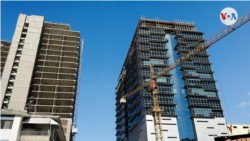Luxury restaurants, opulent shops and modern buildings have emerged in recent years in certain areas of Venezuela, and for a small but very colorful elite: they call it “premium Venezuela” or “the bubble”.
Very few have access to it in this country that remains deeply impoverished and increasingly unequal at the level of countries like Namibia, Mozambique and Angola.
“Venezuela Premium is that new economic sector that has originated after the Venezuelan crisis, as a result of hyperinflation, sanctions,” he explained to the voice of america Manuel Parejo, economist at the Omnis firm.
“That inequality has been amplified and that profile or that socioeconomic class at high levels has once again been able to access new services, products that have been released on the market.”
After seven years of recession and four of hyperinflation, Venezuela is seeing a relative recovery, which goes through informal dollarization and the easing of strict price controls.
Poverty has decreased for the first time in seven years, according to the National Survey of Living Conditions (Encovi) of the Andrés Bello Catholic University, which nevertheless evaluated Venezuela as “the most unequal country in the world from the point of view of income ”.
“And of course, this upper class is getting smaller, but it concentrates a large amount of money and the income of the country,” added Parejo.
It is not that there was no luxury in Venezuela before, which was one of the richest countries on the continent with its oil resources. What is interesting is that after years of desolation, scarcity, and empty shops, there is a boom in these new restaurants, bars, and shops for the upper class, to which a group of people who made their fortune through business with the government.
“We were always a country with an important middle class, a middle class that also had interesting consumption,” said Tiziana Polesel, president of the Consecomercio chamber of commerce.
“These businesses are generally in visible sites, where there is a lot of access to networks, a lot of communication access, sites in general that have a lot of visibility,” he continued.
regional bubbles
These opulent shops are seen in Caracas, but also in other cities in the country, such as Valencia, Puerto La Cruz and Maracaibo, which have cultivated their own bubbles.
“It does not even reach 3%, because, I insist, it is a segment that in Venezuela has always been a minority, that high segment,” said Polesel.
It arouses great interest, because these businesses arise in an increasingly expensive country, with salaries on the ground, and no offer of credit.
What are the chances of survival for these businesses?
“It is the market that is going to tell you”, answers Polesel, who is betting on the revival of tourism. “What can save that this saturation does not happen is that we have people who come from other countries to do tourism in Venezuela, because with only the Venezuelan market, this mortality is very likely to be even higher.”
In any case, the commerce sector estimates that for every business that opens, probably between 10 and 15 close throughout Venezuela, between the lack of financing, high taxes and poor public services.
For this reason, they agree that as long as there are no structural changes in the economy, and as long as more people cannot improve their income, that premium market will see its target increasingly reduced.
“Venezuela has had a growth, in the year 2022, above 15% of the gross domestic product (GDP), the highest economic growth in Latin America and the Caribbean, with the impact of diversifying the economy that we had not had in years “said President Nicolás Maduro at the beginning of January, during his accountability before the National Assembly.
Connect with the Voice of America! Subscribe to our channel Youtube and activate notifications, or follow us on social networks: Facebook, Twitter and instagram.







![[Img #74683]](https://thelatestnews.world/wp-content/uploads/2024/12/The-main-mistakes-to-avoid-when-betting-on-electronic-sports-150x150.jpg)








